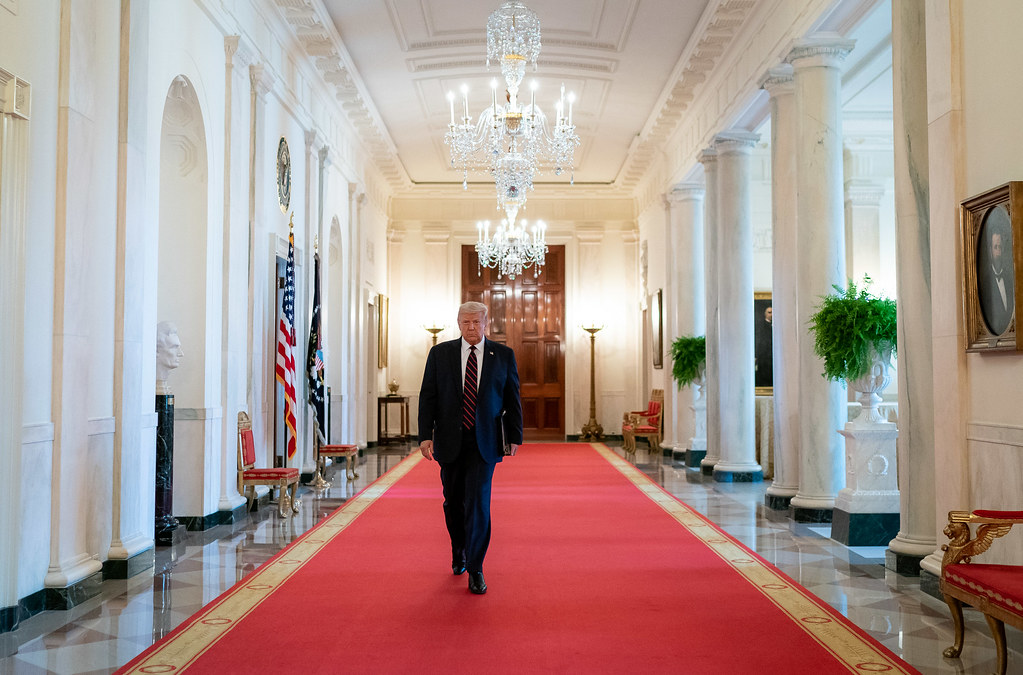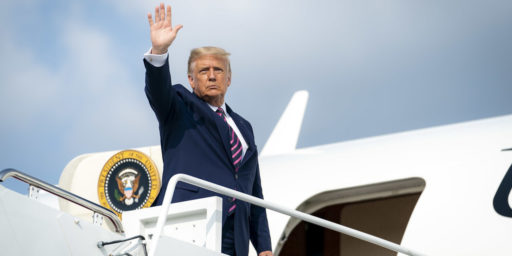America’s Exceptional Failure
Our response to Covid-19 has been exceptional in all the wrong ways.

The NYT has a thorough piece, worth reading in its entirety, on US failures as it pertains to the coronavirus pandemic: The Unique U.S. Failure to Control the Virus. A failure that can be grimly underscored that by the time you read this post, we will likely have our 5 millionth confirmed case (accounting for ~26% of confirmed global cases with ~4% of global population).
The piece makes a comparative point that I have made in private, but am not sure I have noted here at the blog:
Yet even with all of these problems, one country stands alone, as the only affluent nation to have suffered a severe, sustained outbreak for more than four months: the United States.
[…]
When it comes to the virus, the United States has come to resemble not the wealthy and powerful countries to which it is often compared but instead to far poorer countries, like Brazil, Peru and South Africa, or those with large migrant populations, like Bahrain and Oman.
Put another way, the US response has been more in keeping with countries that we once termed “the third world” or the “developing world” than the “first world”/”developed world. Setting aside those out of date (and problematic) concepts, it is decidedly the case that the UNDP’s Human Development Index that we are performing not like our Very High Human Development peers (1st to 62nd), but instead like High Human Development cases (63rd to 116th).
I have studied political development since my undergrad days (unavoidable since I focused on Latin American politics), it is especially stunning to see the US, which is one of the wealthiest, if not the wealthiest (depending on how one defines parameters) country in the world be so inadequate to this task. Even from the perspective of general American self-image, it ought to be a massive embarrassment. The self-perception of US citizens that we are “the greatest country in the world” ought to be rocked by this colossal policy failure–but, of course, Americans are exceptionally bad at making informed global comparisons.
As to why this is the case, the piece posits two themes (that basically echo what I said in one of my posts on masks a few weeks back):
First, the United States faced longstanding challenges in confronting a major pandemic. It is a large country at the nexus of the global economy, with a tradition of prioritizing individualism over government restrictions. That tradition is one reason the United States suffers from an unequal health care system that has long produced worse medical outcomes — including higher infant mortality and diabetes rates and lower life expectancy — than in most other rich countries.
“As an American, I think there is a lot of good to be said about our libertarian tradition,” Dr. Jared Baeten, an epidemiologist and vice dean at the University of Washington School of Public Health, said. “But this is the consequence — we don’t succeed as well as a collective.”
[…]
The second major theme is one that public health experts often find uncomfortable to discuss because many try to steer clear of partisan politics. But many agree that the poor results in the United States stem in substantial measure from the performance of the Trump administration.
The piece details comparative examples of failure in the following areas
- a lack of effective travel restrictions;
- repeated breakdowns in testing;
- confusing advice about masks;
- a misunderstanding of the relationship between the virus and the economy;
- and inconsistent messages from public officials.
Again, I recommend the whole thing, but will highlight the following key failure that needs to be constantly repeated and widely understood:
But there is one way — in addition to the scale of the continuing outbreaks and deaths — that the United States stands apart: In no other high-income country have the messages from political leaders been nearly so mixed and confusing.
There has been an massive failure of governance and leadership by the Trump administration. All of us who feared how a Trump administration would handle a major crisis have had those fear confirmed, and in the extreme.
“If you had to summarize our approach, it’s really poor federal leadership — disorganization and denial,” said Andy Slavitt, who ran Medicare and Medicaid from 2015 to 2017. “Watch Angela Merkel. Watch how she communicates with the public. Watch how Jacinda Ardern in New Zealand does it. They’re very clear. They’re very consistent about what the most important priorities are.”
To quote Trump “It is what it is.”






I saw that earlier and I began reflecting on why the northeast has managed to do better than much of the country. Good political leadership from Gov and legislators of both parties is an obvious reason, but beyond that. At least in New England, despite some libertarian leanings, there is still a well embedded aspect of communitarianism that leads the individual to align his/her needs with those of the broader community. I see this pop up around various issues on a local level with a process for achieving consensus that is akin to the Brit’s ‘muddling through.’
Early in the pandemic, I read commentary from European’s that predicted that America’s federalism and partisanship would restrain an effective response and they were right.
If one could isolate just a few failures of government during the last few decades there would be the occupation of Iraq and Hurricane Katrina and the Covid response. There is a certain commonality there. Actually, there are several.
But…her emails…
@Sleeping Dog:
I wonder if this can be traced back to 400 years of having town meetings, and the culture in New England that engendered?
Or, as a prominent person once called them, “shithole countries.”
@CSK:
If I were to have continued my thought and fleshed it out, I would have mentioned town form of government and many citizens experience with direct democracy. Even though town meeting participation is only 3-6% with standalone voting on the town warrant, probably 15%, there is a turnover in participants and they carry the experience with them. And let’s not forget, that outside of a handful of large cities, most NE towns have populations well under 25,000 in a relatively small geographic area, making peer pressure real.
@CSK: Was just going to point this out.
I was reading a piece a few months ago that traced some of the New England compliance back to a trust in local authorities, which was attributed to a much closer connection to governing units–basically, the town meeting format. Maine, Vermont, New Hampshire, Massachusetts, Connecticut–it’s interesting to see how closely relative success at dealing with covid tracks with states that still have this style of governance.
@Sleeping Dog: @Jen:
Centuries of practice at deciding things for the common good seems to have become second nature to us.
@Jen:
You’re reading way too much into this…we’re just smarter. Wearing a mask is an IQ test.
@Jen:
@CSK:
Last winter, the Globe ran a short series to the effect that Massachusetts was the most successful state in managing big issues and it went on to review a number of things, one of the reasons that underlies that success is trust in government. It seems weird, because many of us would consider the state pretty eff’d up, but when you look at issues like education, social safety net, healthcare, and the economy, the state does rank at or near the top.
@Daryl and his brother Darryl: wait does that make me a coastal elite? Do I get a badge or something?
@Daryl and his brother Darryl:
Actually, Massachusetts has the first highest average I.Q, followed by New Hampshire with the second. Connecticut, Vermont, and Maine are in the top nine. So, yes, we are smarter.
@Jen:
Well, you’re definitely not a real American.
@Daryl and his brother Darryl:
How do you think this would have gone with Clinton as President?
I assume the fine folks in the Republican Senate would be continuing the cooperation they showed Obama. So, any reasonable restrictions would be opposed, any aid would be opposed, any preparation would be opposed. A national response would be sabotaged. It would be decried as socialism and tyranny.
It might actually be worse. The relief bills wouldn’t have happened, or been watered down to half their size, and then redirected to tax breaks for “job creators”.
The only scenario where it might work out better is if the CDC was able to get on the ground in China and make a difference in containing the virus in Wuhan, which might have been possible.
But in this alternate world, if covid becomes pandemic, we are screwed. Also, we might not have the House of Representatives.
I wish it wasn’t like this — that the Republican Party was interested in governing in the best interests of the people they represent — but I have seen no evidence of it. We are handcuffed to lunatics.
@Jen:
Didn’t they teach you the secret handshake?
@CSK: As opposed to the alternative scenario in my part of the country, where in a lot of the part outside the city limits of the 2 towns that make up roughly half of the county population (and are across the river from each other making them essentially one urban center) your nearest neighbor is maybe a mile or two away.
While I was in grad school, I worked at a roadside restaurant. Several of the other employees lived in mobile homes near the restaurant. When I asked them if it was for the convenience to their job, most said that the convenience was nice, but that they couldn’t stand living in the city–Ellensburg, WA, population at the time about 6,000. The lifestyle doesn’t engender warm, fuzzies for one’s neighbors. Add that libertarian politics are quite popular in rural Washington–we even elected a libertarian to the legislature some time back–and it can be very hard to create community.
I recall that Trump embraces a “keep ’em guessing” style of communication. He wants people to always have some doubt about what he thinks and what he might do. He finds this valuable, and there is some value to it in some types of negotiations. But it is highly undesirable in this circumstance. This is, I think a fine example of how business leadership doesn’t really translate to governance. If you’re trying to put together an enormous real estate development deal, it’s probably good to keep things mysterious and questionable.
Consistency, like you describe from Merkel, is the opposite of this. He can’t switch gears. He can’t consider, as I’ve always said, the good of the country as something separate from what’s good for him. To him, that would make him a “loser”.
Under Trump the Small, America has become a third kind of nation: an undeveloping country.
@Gustopher:
I can only imagine that the pandemic would have been taken seriously; the playbook Obama left would have been followed.
There would have been clear communication; there would not have been the mixed messages or magical thinking.
The DPA would have been activated quickly, and PPE and ventilators would have been produced and distributed quicker and more reliably.
There would be a national testing and tracing strategy, whether Republican Governors chose to follow or not.
There would not be incompetent sycophants running the CDC and HHS, or a scarf lady toadying up to the orange fuqwad.
None of these things require McConnell to go along.
@Just nutha ignint cracker:
We have *loads* of those in New Hampshire, in fact we were targeted for the Free State Project specifically because it’s so easy to get elected to our state legislature (it’s huge). I’ve actually been wondering how that was going to impact our covid response. Apparently not too much?
@Daryl and his brother Darryl: I refuse to believe there’s a secret handshake, New Englanders do not care to touch one another.
Actually, I think I just figured out why our covid response has been sufficient…
Why are the Northern states doing better? Here’s my guesses:
1) We were hit very badly right out of the gate and so had no illusions that we would be spared. There was no testing, no knowledge base, and normal types of treatment (intubate and ventilate at 85% oxygen saturation) were making things worse. We had to try, learn, and bury the dead and move on to the next case.
2) People in colder climates understand the need for collective action and the uses of government. Rain runs off the road but snow needs to be plowed. The occasional tree overgrown with Kudzu might fall and knock down a power line but if all the branches alongside all the roads aren’t kept trimmed the next ice storm could bring a statewide power outage of weeks before all the line breaks are repaired. And if everyone’s air conditioning goes out it’s darn uncomfortable but if everyone’s heat goes out people will start freezing to death, starting with the old and young.
3) People in the Northeast have an expectation that things will get better, for everyone, and government is a part of that. People in the Old South believe the primary purpose of government is to keep the class system in place and ensure that no one gets above their station. It’s not for nothing that an article that came out today pointed out that “8 of the 10 states that refused the Medicaid expansion and Obamacare are from the Confederacy”.
I could think of more, but you get the idea. It doesn’t have anything to do with intelligence. It has to do with expectations and motivations.
I could believe the greater community thing. I live in a western state where the population has been exploding for 30+ years. 3.3M when we moved here 32 years ago, pushing 6M today. We’re currently adding another million people about every 11-12 years. Hard for community to keep up under those conditions.
It just seems so perfect that some bozo who promised to “Make America Great Again” has done the exact opposite of what he promised…there is no doubt an Orwellian reference in there…
This lack of communitarianism in our country as a whole is one of our biggest problems, wouldn’t you say?
And in yet another irony, if Clinton had won, the Republicans probably would now have unbreakable solid locks on both houses of Congress as well as most state legislatures with far reaching consequences for the census and redistricting…how the world turns…
Translation: “Libertarianism works beautifully (for some) when everything is normal, but then something unexpected happens and suddenly everyone is much worse off than if they had had an actual competent government. Who could have predicted that?”
@DrDaveT: You can’t tilt at the windmills if no one put them up and kept them maintained.